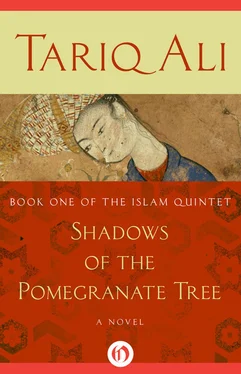‘May Allah protect you all today,’ said the old man as he replaced the cover and returned the courtyard to normal.
Within a few minutes, they were at the old market. Zuhayr had feared that the exit to the tunnel might be impossible to lift because of the crowds, but fate favoured them. The cover was raised without any hindrance. As seven men emerged from underneath the floor on to the roofed entrance to the marker, a group of bewildered citizens watched in amazement. The men were followed by a disembodied weapon: Zuhayr had handed his sword through the hole to Ibn Basit, who had preceded him. Now he lifted himself up, replacing the stone immediately so that in the general confusion its exact location would be forgotten.
It was a scene that none of them would forget. They saw the backs of tens of thousands of men, women and children who had assembled near the Bab al-Ramla in a spirit of vengeance. This is where they had stood in 1492 and watched in disbelief as the crescent was hurled down from the battlements of the al-Hamra, accompanied by the deafening noise of bells interspersed with Christian hymns. This is where they had stood in silence last year while Cisneros, the man they called ‘Satan’s priest,’ had burnt their books. And it was in this square only a month later that drunken Christian soldiers had tipped the turbans off the heads of two venerable Imams.
The Moors of Gharnata were not a hard or stubborn people, but they had been ceded to the Christians without being permitted to resist, and this had made them very bitter. Their anger, repressed for over eight years, had come out into the open. They were in a mood to attempt even the most desperate measures. They would have stormed the al-Hamra, torn Ximenes limb from limb, burnt down churches and castrated any monk they could lay their hands on. This made them dangerous. Not to the enemy, but to themselves. Deprived by their last ruler of the chance to resist the Christian armies, they felt that it was time they reasserted themselves.
It is sometimes argued, usually by those who fear the multitude, that any gathering which exceeds a dozen people becomes a willing prey to any demagogue capable of firing its passions, and thus it is capable only of irrationality. Such a view is designed to ignore the underlying causes which have brought together so many people and with so many diverse interests. All rivalries, political and commercial, had been set aside; all blood-feuds had been cancelled; a truce had been declared between the warring theological factions within the house of al-Andalusian Islam; the congregation was united against the Christian occupiers. What had begun as a gesture of solidarity with a widow’s right to protect her children had turned into a semi-insurrection.
Ibn Wahab, the proud and thoughtless executioner of the royal bailiff, stood on a hastily constructed wooden platform, his head in the clouds. He was dreaming of the al-Hamra and the posture in which he would sit when he received ambassadors from Isabella, pleading for peace. Unhappily his first attempt at oratory had been a miserable failure. He had been constantly interrupted.
‘Why are you mumbling?’
‘What are you saying?’
‘Talk louder!’
‘Who do you think you are addressing? Your beardless chin?’
Angered by this lack of respect, Ibn Wahab had raised his voice in the fashion of the preachers. He had spoken for almost thirty minutes in a language so flowery and ornate, so crowded with metaphors and so full of references to famous victories stretching from Dimashk to the Maghreb that even those most sympathetic to him amongst the audience were heard remarking that the speaker was like an empty vessel, noisy, but devoid of content.
The only concrete measure he had proposed was the immediate execution of the soldiers and the display of their heads on poles. The response had been muted, which caused a qadi to enquire if there was anybody else who wished to speak.
‘Yes!’ roared Zuhayr. He lifted the sword above his head and, with erect shoulders and an uplifted face, he moved towards the platform. His comrades followed him and the crowd, partially bemused by the oddity of the procession, made way. Many recognized him as a scion of the Banu Hudayl. The qadi asked Ibn Wahab to step down and Zuhayr was lifted on to the platform by a host of willing hands. He had never spoken before at a public gathering, let alone one of this size, and he was shaking like an autumn leaf.
‘In the name of Allah, the Merciful, the Beneficent.’ Zuhayr began in the most traditional fashion possible. He did not dwell for long on the glories of their religion, nor did he mention the past. He spoke simply of the tragedy that had befallen them and the even greater tragedy that lay ahead. He found himself using phrases which sounded oddly familiar. They were. He had picked them up from al-Zindiq and Abu Zaid. He concluded with an unpopular appeal.
‘Even as I speak to you, the soldier who witnessed the execution is at the al-Hamra, describing every detail. But put yourself in his place. He is racked by fear. To make himself sound brave, he exaggerates everything. Soon the Captain-General will bring his soldiers down the hill to demand the release of these men whom we have made our prisoners. Unlike my brother Ibn Wahab I do not believe that we should kill them. I would suggest that we let them go. If we do not, the Christians will kill ten of us for each soldier. I ask you: is their death worth the destruction of a single believer? To release them now would be a sign of our strength, not weakness. Once we have let them go we should elect from amongst ourselves a delegation which will speak on our behalf. I have many other things to say, but I will hold my tongue till you pronounce your judgement on the fate of these soldiers. I do not wish to speak any more in their presence.’
To his amazement, Zuhayr’s remarks were greeted with applause and much nodding of heads. When the qadi asked the assembly whether the soldiers should be freed or killed the response was overwhelmingly in favour of their release. Zuhayr and his friends did not wait for instructions. They rushed to where the men were being held prisoner. Zuhayr unsheathed his sword and cut the rope which bound them. Then he marched them to the edge of the crowd and pointed with his sword in the direction of the al-Hamra and sent them on their way. The incredulous soldiers nodded in silent gratitude and ran away as fast as their legs could take them.
In the palace, just as Zuhayr had told them, the soldier who had been permitted to leave earlier, assuming that his comrades would by now have been decapitated, had embellished his own role in the episode. The Archbishop heard every word in silence, then rose without uttering a word, indicated to the soldier that he should follow him and walked to the rooms occupied by the Count of Tendilla. He was received without delay and the soldier found himself reciting his tale of woe once again.
‘Your Excellency will no doubt agree,’ began Ximenes, ‘that unless we respond with firmness to this rebellion, all the victories achieved by our King and Queen in this city will be under threat.’
‘My dear Archbishop,’ responded the Count in a deceptively friendly tone, ‘I wish there were more like you in the holy orders of our Church, so loyal to the throne and so devoted to increasing the property and thereby the weight and standing of the Church.
‘However, I wish to make something plain. I do not agree with your assessment. This wretched man is lying to justify falling on his knees before the killers of Barrionuevo. Not for one minute will I accept that our military position is threatened by this mob. I would have thought that, if anything, it was Your Grace’s offensive on behalf of the Holy Spirit which was under threat.’
Читать дальше












